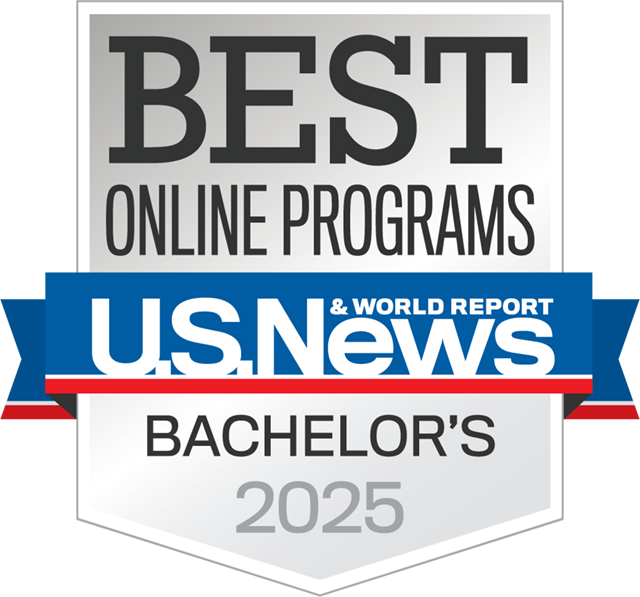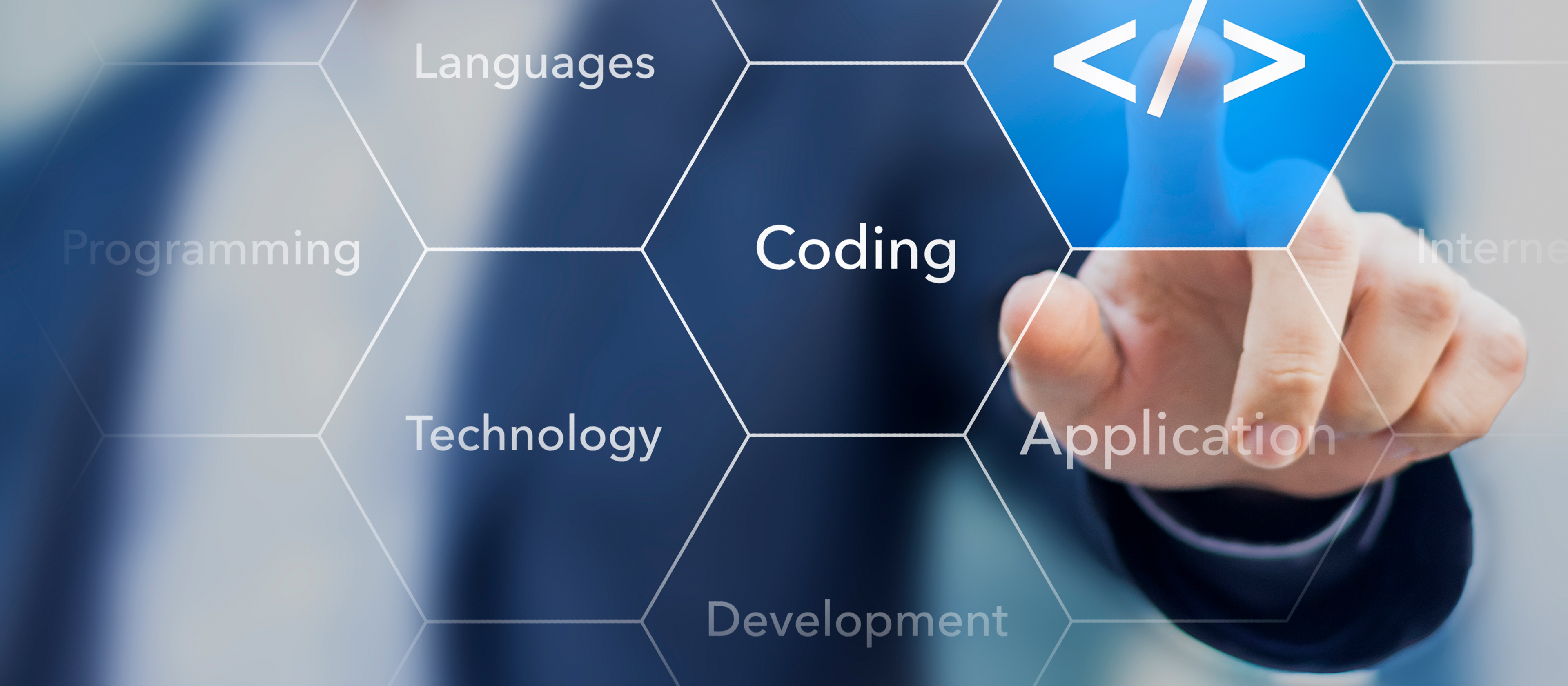100% Online
Complete your Penn State course work at your own pace and 100% online.
Application deadline
Credits and costs
Nationally Recognized

Gain Engineering Skills to Excel in an In-Demand Field
Create, maintain, and improve software systems in economical, reusable, and extendable ways in industries including medical, military, communications, aerospace, business, scientific, and general computing.
Plan, manage, and implement a software design with state-of-the-art technologies as part of a team working within the industry.
Solve problems and keep critical systems operating accurately and efficiently using research, design, development, and testing skills.
Create innovative applications that enable computers to perform tasks smarter, faster, and better.
Your Online Software Engineering Program Courses
Your Online Software Engineering Program Courses
Courses cover a wide array of software engineering topics, including discrete mathematics, probability, and statistics, along with relevant topics in computer science and supporting disciplines for a comprehensive look at modern computer software and techniques.
The Bachelor of Science in Software Engineering program requires you to complete a minimum of 126 credits including a capstone course. As part of SWENG 480/481, taken during your senior year, you'll be required to complete a capstone project which includes collaborating with fellow students to design, plan, manage, and implement a software system and provide you with experience working with real industries.
The curriculum addresses a variety of software engineering topics for comprehensive coverage of modern software and techniques including:
- discrete mathematics
- probability and statistics
- computer programming
- object-oriented methodology
- software design
- software validation and verification
- software security
- computer networks
Software Engineering Program Entrance-to-Major Requirements
Students transferring directly into the major with less than 45 transferable credits must have a cumulative grade point average of 2.7 or higher and have completed:
- 8 credits of calculus with analytic geometry,
- 4 credits of calculus-based physics,
- and 4 credits of college chemistry including a laboratory
Students transferring directly into the major with more than 45 transferable credits must have a cumulative grade point average of 2.7 or higher and:
- a Behrend campus dean's review is required for all students in order to enter the major directly, as well as for all students who have earned 45 or more transferrable credits
- current Penn State students must have a grade point average of 2.0 or higher to enter the major
Entrance Requirement: In addition to the Carnegie unit and minimum GPA requirements described by University policies, all students applying for entrance to any of the engineering majors at Penn State Behrend must have at least a 2.0 cumulative GPA by the end of the semester prior to applying for entrance to the major and have completed, with a minimum grade of C:
- CHEM 110 GN(3),
- MATH 140 GQ(4),
- MATH 141 GQ(4),
- and PHYS 211 GN(4).
These courses must be completed by the end of the semester during which the admission-to-major process is being carried out.
Prescribed Courses (86 credits)
- 3credits
First semester of a two-semester, comprehensive general chemistry course that introduces students to the basic principles of chemistry with an emphasis on the relationships between the microscopic structure and the macroscopic properties of matter.
- Prerequisite
Completion of or placement beyond MATH 22
- C or better
A student enrolled in this course must receive a grade of C or better.
- 1credit
Introduction to quantitative experimentation in chemistry.
- Prerequisite or Concurrent
CHEM 110 or CHEM 106
- 4credits
Introduction to digital systems and their design.
- Concurrent
PHYS 212
- 3credits
Microprocessor architecture; memory system design; assembly language programming; interrupts; the stacks and subroutines; memory and I/O inter-facing; serial I/O and data communications; microprocessors applications.
- Prerequisite
CMPEN 271 and CMPEN 275
- C or better
A student enrolled in this course must receive a grade of C or better.
- 3credits
Resource management in computer systems.
- Prerequisite
CMPSC 360
- C or better
A student enrolled in this course must receive a grade of C or better.
- 3credits
Data transmission, encoding, link control techniques, network architecture, design, protocols, and multiple access.
- Prerequisite
(CMPEN 270 or CMPEN 271) and (CMPSC 121 or CMPSC 201)
- C or better
A student enrolled in this course must receive a grade of C or better.
- 3credits
Introduction to programming techniques design and implementation of algorithms. Structured programming. Problem-solving techniques. Introduction to a high-level language, including arrays, procedures, and recursion
- Prerequisite
MATH 110 or prerequisite or concurrent MATH 140
- 3credits
Object-oriented programming, recursion, fundamental data structures (including stacks, queues, linked lists, hash tables, trees, and graphs), the basics of algorithmic analysis, and an introduction to the principles of language translation.
- Prerequisite
CMPSC 121
- C or better
A student enrolled in this course must receive a grade of C or better.
- 3credits
Discrete mathematics and foundations for modern computer science.
- Prerequisite
CMPSC 122
- C or better
A student enrolled in this course must receive a grade of C or better.
- 3credits
Topics include: conceptual data modeling, relational data model, relational query languages, schema normalization, database/Internet applications, and database system issues.
- Prerequisite
CMPSC 221 and ENGL 202C
- C or better
A student enrolled in this course must receive a grade of C or better.
- 3credits
Fundamental concepts of programming language design, specifications, and implementation; programming language paradigms and features; program verification.
- Prerequisite
CMPSC 221 or CMPSC 360
- C or better
A student enrolled in this course must receive a grade of C or better.
- 3credits
Fundamental concepts of computer science: data structures, analysis of algorithms, recursion, trees, sets, graphs, sorting.
- Prerequisite
CMPSC 122 and (CMPSC 360 or MATH 311W)
- C or better
A student enrolled in this course must receive a grade of C or better.
- 3credits
Writing for students in scientific and technical disciplines.
- Prerequisite
(ENGL 15 or ENGL 30) and 4th semester standing
- C or better
A student enrolled in this course must receive a grade of C or better.
- 4credits
Introduces and develops the mathematical skills required for analyzing change and creating mathematical models that replicate real-life phenomena. Develops student knowledge of calculus techniques and how to use the calculus environment to develop critical thinking and problem-solving skills.
- Prerequisite
MATH 22 and MATH 26 or MATH 26 and satisfactory performance on the mathematics placement examination or MATH 40 or MATH 41 or satisfactory performance on the mathematics placement examination.
- C or better
A student enrolled in this course must receive a grade of C or better.
- 4credits
Derivatives, integrals, applications; sequences and series; analytic geometry; polar coordinates.
- Prerequisite
MATH 140 or MATH 140A or MATH 140B or MATH 140E or MATH 140G or MATH 140H
- C or better
A student enrolled in this course must receive a grade of C or better.
- 2credits
Systems of linear equations; matrix algebra; eigenvalues and eigenvectors; linear systems of differential equations.
- Prerequisite
MATH 110, MATH 140, or MATH 140H
- 3credits
First- and second-order equations; special functions; Laplace transform solutions; higher order equations.
- Prerequisite
MATH 141
- 3credits
Examination of fundamental principles and processes applicable to the study of management. Not available to students who have taken BA 304.
- Prerequisite
(ENGL 15 or ENGL 30) and (ECON 102 or ECON 104) and (MATH 21 or higher or satisfactory score on the mathematics placement examination)
- C or better
A student enrolled in this course must receive a grade of C or better.
- 4credits
Calculus-based study of the basic concepts of mechanics: motion, force, Newton's laws, energy, collisions, and rotation.
- Concurrent
MATH 140
- C or better
A student enrolled in this course must receive a grade of C or better.
- 4credits
Calculus-based study of the basic concepts of electricity and magnetism.
- Prerequisite
MATH 140 and PHYS 211
- Concurrent
MATH 141
- 3credits
Combinatorial analysis, axioms of probability, conditional probability and independence, discrete and continuous random variables, expectation, limit theorems, additional topics
- Prerequisite
MATH 141
- C or better
A student enrolled in this course must receive a grade of C or better.
- 3credits
Design, documentation, testing, and construction of software using software engineering strategies embodied in object-oriented programming languages.
- Prerequisite
CMPSC 122
- C or better
A student enrolled in this course must receive a grade of C or better.
- 3credits
Software engineering principles including lifecycle, dependability, process modeling, project management, requires specification, design analysis, implementation, testing, and maintenance.
- Prerequisite
CMPSC 122
- Concurrent
SWENG 311
- C or better
A student enrolled in this course must receive a grade of C or better.
- 3credits
The analysis and design of software systems using canonical design patterns.
- Prerequisite
SWENG 411
- C or better
A student enrolled in this course must receive a grade of C or better.
- 3credits
Introduction to methods of software verification, validation, and testing; mathematical foundations of testing, reliability models; statistical testing.
- Prerequisite
SWENG 411 or STAT 301
- C or better
A student enrolled in this course must receive a grade of C or better.
- 3credits
The design and implementation of real time systems.
- Prerequisite
CMPSC 472 or CMPSC 473 or CMPEN 441
- C or better
A student enrolled in this course must receive a grade of C or better.
- 3credits
Concepts of engineering ethics, economy, and project management, senior capstone project selection, and technical communication skills.
- Prerequisite
SWENG 431
- C or better
A student enrolled in this course must receive a grade of C or better.
- 3credits
Capstone group design projects in software engineering.
- Prerequisite
SWENG 480
- C or better
A student enrolled in this course must receive a grade of C or better.
Additional Courses (6 credits)
- 3credits
Methods of economic analysis and their use; price determination; theory of the firm; distribution.
- or:3credits
National income measurement; aggregate economic models; money and income; policy problems.
- 3credits
D.C. and A.C. circuits, transformers, single and three-phase distribution systems, A.C. motors and generators.
- Prerequisite
PHYS 212
- Concurrent
MATH 250
Supporting Courses and Related Areas (select 9 credits)
Select 3 credits from an approved list of 400-level courses, in consultation with an adviser, in addition to the following courses:
- 3credits
This course will start with an overview of supervised and unsupervised learning, and introduce the associated libraries. It covers basic machine learning concepts, tasks, and workflow using an example classification problem based on K-nearest neighbors, Naïve Bayes, Support Vector Machine (SVM), K-means, and implementation using Python libraries.
- Prerequisite
STAT 318 and MATH 220 and (CMPSC 122 or CMPSC 132)
- 3credits
This course introduces software quality, the associated quality factors, software errors and the software quality assurance system.
Electives (select 1 credit)
Select 1 credit in consultation with an adviser.
General Education Requirements
Some General Education requirements may be satisfied by courses required for the major. Students should work with an adviser to select courses.
- Foundations: 15 credits
All courses require a grade of C or better. Inter-Domain courses may not be used for foundations requirements.- Writing/Speaking: 9 credits
- Quantification: 6 credits
3-6 credits are selected from mathematics, applied mathematics, and statistics; 3 credits may be selected from computer science or symbolic logic.
- Knowledge Domains: 15 credits
Inter-Domain courses may not be used for knowledge domain requirements.- Health and Wellness (GHW): 3 credits
- Natural Sciences (GN): 3 credits
- Arts (GA): 3 credits
- Humanities (GH): 3 credits
- Social and Behavioral Sciences (GS): 3 credits
- Integrative Studies: 6 credits
- Inter-Domain course work: 6 credits
- Exploration: 9 credits
- Natural Sciences (GN) (may be Inter-Domain): 3 credits
- GA, GH, GN, GS, and Inter-Domain courses: 6 credits
May include 3 credits of World Language course work beyond the requirements of the student’s degree program or at the 12th credit level, whichever is higher.
These General Education Requirements are for students who started in summer 2023 or later. Students who started earlier can review the prior version of the general education requirements.
Course Availability
If you're ready to see when your courses will be offered, visit our public LionPATH course search (opens in new window) to start planning ahead.
Start or Advance Your Software Engineering Career

Start or Advance Your Software Engineering Career
As a graduate of this program, you should be well-prepared to apply your knowledge, techniques, and skills to develop software and provide innovative solutions in industry and government.
Job Titles Related to This Degree
The following roles are often held by people with this type of degree:
- Application Integration Engineer
- Software Architect
- Software Development Engineer
- Software Engineer
- Software Quality Assurance Engineer (SQA Engineer)
Employment Outlook for Occupational Fields Related to This Degree
Estimates of employment growth and total employment are provided by the U.S. Bureau of Labor Statistics and are subject to change. While these occupations are often pursued by graduates with this degree, individual outcomes may vary depending on a variety of factors. Penn State World Campus cannot guarantee employment in a given occupation.
Software Developers
Software Quality Assurance Analysts and Testers
Career Services to Set You Up for Success

From the day you're accepted as a student, you can access resources and tools provided by Penn State World Campus Career Services to further your career. These resources are beneficial whether you're searching for a job or advancing in an established career.
- Opportunities to connect with employers
- Career counselor/coach support
- Occupation and salary information
- Internships
- Graduate school resources
Upcoming Events
Ready to Learn More?
Get the resources you need to make informed decisions about your education. Request information on this program and other programs of interest by completing this form.
Ready to take the next step toward your Penn State bachelor's degree?
Costs and Financial Aid
Costs and Financial Aid
Learn about this program's tuition, fees, scholarship opportunities, grants, payment options, and military benefits.
Costs and Financial Aid
Undergraduate Tuition
Undergraduate tuition is calculated based on the number of credits for which you register and the number of total credits you have accrued at or transferred to Penn State.
Tuition is due shortly after each semester begins and rates are assessed every semester of enrollment.
2024–25 Academic Year Rates
| How many credits do you plan to take per semester? | If you have 59 or fewer credits | If you have 60 or more credits |
|---|---|---|
| 11 or fewer | $632 per credit | $678 per credit |
| 12–19 | $7,678 per semester | $8,288 per semester |
2025–26 Academic Year Rates
| How many credits do you plan to take per semester? | If you have 59 or fewer credits | If you have 60 or more credits |
|---|---|---|
| 11 or fewer | $638 per credit | $685 per credit |
| 12–19 | $7,755 per semester | $8,371 per semester |
Undergraduate students taking more than 19 credits will be charged the flat tuition rate plus the regular per credit hour rate for each credit above 19.
Financial Aid and Military Benefits
Some students may qualify for financial aid. Take the time to research financial aid, scholarships, and payment options as you prepare to apply. Federal financial aid may only be used to pay for credits used to satisfy program requirements.
Military service members, veterans, and their spouses or dependents should explore these potential military education benefits and financial aid opportunities, as well.
Additional Cost of Attendance Details
To view the detailed list of cost of attendance elements:
- visit the Tuition Information site
- click the plus sign to expand the table
- select a semester from the World Campus row
Nationally Accredited Bachelor’s Degree Program

The program combines a highly focused curriculum with a flexible, convenient, online format, allowing you to maintain your professional commitments as you acquire a valued credential. The software engineering program is one of the select online programs that is accredited by the Engineering Commission of ABET.
Set Your Own Pace

Set Your Own Pace
Whether you are looking to finish your program as quickly as possible or balance your studies with your busy life, Penn State World Campus can help you achieve your education goals. Many students take one or two courses per semester.
Our online courses typically follow a 12- to 15-week semester cycle, and there are three semesters per year (spring, summer, and fall). If you plan to take a heavy course load, you should expect your course work to be your primary focus and discuss your schedule with your academic adviser.
Convenient Online Format
This program's convenient online format gives you the flexibility you need to study around your busy schedule. You can skip the lengthy commute without sacrificing the quality of your education and prepare yourself for more rewarding career opportunities without leaving your home.
A Trusted Leader in Online Education

Penn State has a history of more than 100 years of distance education, and World Campus has been a leader in online learning for more than two decades. Our online learning environment offers the same quality education that our students experience on campus.
Information for Military and Veterans

Are you a member of the military, a veteran, or a military spouse? Please visit our military website for additional information regarding financial aid, transfer credits, and application instructions.
Professional Licensure/Certification
Disclosures
Many U.S. states and territories require professional licensure/certification for employment. If you plan to pursue employment in a licensed profession after completing this program, please visit the Professional Licensure/Certification Disclosures by State interactive map for more information.
How to Apply to Penn State

How to Apply to Penn State
Apply by October 31 to start January 12
Application Instructions
Deadlines and Important Dates
Complete your application and submit all required materials by the appropriate deadline. Your deadline will depend on the semester you plan to start your courses.
Spring Deadline
Apply by October 31 to start January 12Summer Deadline
Apply by March 15, 2026, to start May 18, 2026
New students are encouraged to complete the FAFSA by March 1. Please visit the Office of Student Aid website for more information about applying for financial aid and recommended deadlines.
Steps to Apply
To apply for this program, you must be a high school graduate or have completed your GED.
This degree program includes Entrance-to-Major requirements (ETMs). After you are admitted to Penn State, you’ll complete them during your first few semesters to officially become a software engineering major. If you satisfy these requirements with transfer credits, you’ll be admitted directly into the major.
You will need the following items to complete your application:
High school transcripts or GED transcript — First-year applicants are required to submit Self-Reported Academic Records (SRAR) when applying. Official high school transcripts for first-year applicants will only be required at the time a student accepts an offer of admission to Penn State.
Transfer international students will need to submit their high school transcript before their application can be reviewed.
Official college or university transcripts and/or official military transcripts (if applicable) — All college or university transcripts are required regardless of the length of time that has passed, the grades earned, or the accreditation of the institutions attended. Acceptance of transfer credit toward your degree is subject to final approval by the academic department. For detailed information, see the Transfer Students page.
Transcripts not in English must be accompanied by a certified translation.
English Proficiency — The language of instruction at Penn State is English. With some exceptions, international applicants must take and submit scores for the Test of English as a Foreign Language (TOEFL) or International English Language Testing System (IELTS). Minimum test scores and exceptions are found in the English Language Proficiency section on the Undergraduate Admissions International Requirements page. Visit the TOEFL website for testing information. Penn State's institutional code is 2660.
To begin the online application, you will need a Penn State account.
Create a New Penn State Account
If you have any problems during this process, contact an admissions counselor at [email protected].
Please note: Former Penn State students may not need to complete the admissions application or create a new Penn State account. Please visit our Returning Students page for instructions.
Accessing MyPennState
The MyPennState Portal provides access to our online admissions services. Before accessing MyPennState, you must have a Penn State account that will be used to access all Penn State systems. After creating an account, you will receive a unique Penn State User ID. You will need to enter your User ID followed by @psu.edu when signing in to MyPennState and other Penn State sites. For example, you should be entering something like '[email protected]' in the Sign In field.
The application consists of six sections:
- Application Setup
- Program of Study
- Citizenship and Residency
- Academics and Experience
- Miscellaneous
- Review and Submit
Application Setup
Be sure to select "Online" for the "How would you like to complete your degree" question if you plan to attend Penn State World Campus.
The rest of this section will ask some basic questions about your education experience and military affiliation.
Program of Study
You will choose the degree type and then the starting semester.
Your starting campus will be selected as Penn State World Campus by default as long as you picked "Online" in your Application Setup. Click Continue.
On the Choose a Program page, select your intended major from the list.
Review your selection on the summary screen and click Continue to move on to the Citizenship and Residency section.
Citizenship and Residency
Complete the series of questions about your citizenship status, demographic information, Pennsylvania residency status, and family history.
Academics and Experience
You will need to enter academic experience information about your high school and any attempted courses at a college or university after high school.
The Education Gap Statement offers a place to explain any time that has elapsed between your high school graduation and your anticipated enrollment at Penn State. Please provide a summary of why that gap occurred. Some examples that would explain a gap in your education include work, family, attending another college or university, etc.
Miscellaneous
In the Miscellaneous section, you will provide any program-specific requirements (e.g., a personal statement), information about activities, and financial aid information.
Review and Submit
Review your information, digitally sign your application, and provide payment for the application fee ($65 domestic or $75 international).
High School Transcripts and Academic Record
After your application is completed, you will also need to self-report your high school course work before the application deadline. You will be directed to fill out the Self-Reported Academic Record (SRAR). It is helpful to have a high school transcript available when completing this section. In the third section, you'll select your program of study and campus.
Official high school transcripts or GED transcript, along with records from high school, are required, regardless of the length of time that has passed.
Include any college/university transcripts (required), military transcripts, and Proof of English Language proficiency (if applicable). SAT/ACT scores are not required if you are identified as an adult learner or transfer student.
All official documents should be sent to:
Undergraduate Admissions Office
The Pennsylvania State University
201 Shields Building
University Park, PA 16802You can also have your transcripts sent electronically through Parchment, eScript-Safe, or the National Clearinghouse directly to Penn State from the college/university where course work was attempted.
Acceptance
After receiving your application, application fee, and all required materials, your application will be evaluated for admission. You can check your application status online. This will provide the most up‐to‐date information about the status of your application and is updated once daily, before 8:00 a.m. (ET). Once a decision has been made regarding your application, it will be available to you through the MyPennState portal.
For information on when you can expect an admissions decision, visit the Dates and Deadlines page of the Undergraduate Admissions website. Make sure you click the "+" sign to see these dates for World Campus Applicants (First-Year and Transfer).
5. Complete the application.
Admissions Help
If you have questions about the admissions process, contact an admissions counselor at [email protected].
Contact Us

Contact Us
Have questions or want more information? We're happy to talk.
To learn more about the Bachelor of Science in Software Engineering, offered in partnership with the the Penn State Behrend School of Engineering, please contact:
World Campus Admissions Counselors
Phone: 814-863-5386
[email protected]
Learn from the Best
Learn from the Best
Penn State's B.S. in Software Engineering, offered in partnership with the Penn State Behrend School of Engineering, provides a strong foundation in software engineering using a combination of classroom study, software development experience, and design projects to give you a comprehensive understanding of the field and prepare you for the workforce or future study.
Faculty
Chen Cao
- DegreePh.D., Computer Science and Technology Information Security, University of Chinese Academy of Sciences
- DegreeBE, Information Security, China University of Mining and Technology
Dr. Chen Cao's research interest is in systems security, which focuses on attack and defense. To attack a system, the adversary must know about weaknesses in the system and exploit them to perform attacks. To defend a system, the defender must be aware of weaknesses and protect the system by patching it or adding resilience to the system. That is to say, the weakness, i.e., vulnerability, is a key role in systems security research.
Shahid Hussain
- DegreePh.D., Computer Science, City University of Hong Kong
- DegreeM.S., Software Engineering, City University of Science and Information Technology, Pakistan
- DegreeM.Sc., Computer Science, Gomal University, Pakistan
- DegreeB.Sc., Computer Science, Gomal University, Pakistan
Dr. Shahid Hussain is an assistant professor of computer science and software engineering at Penn State Behrend. Previous experience includes working as a programmer with SRDC and the British Council. Dr. Hussain's research focus is to explore the SE practices to analyze the quality of HPC software packages and applications, SE for emerging technologies, and the implications of ML and DL, software fairness analysis, AI, big data analysis, and soft computing techniques.
Naseem Ibrahim
- DegreePh.D., Computer Science, Concordia University
- DegreeM.S., Computer Science, Concordia University
- DegreeB.S., Computer Science, Concordia University
Dr. Naseem Ibrahim joined Penn State Behrend as an assistant professor of computer science and software engineering in fall of 2015. Formerly, he was an assistant professor at Albany State University from fall of 2012 to spring of 2015. Dr. Ibrahim's teaching interests include software engineering, object-oriented analysis and design, software architecture, software specification, and computer networks. His research interests include software engineering, service-oriented architecture, cloud computing, formal specification, and trustworthy systems.
Russell Martin
- DegreeM.S., Business Administration
- DegreeB.S., Management Information Systems
After spending 20 years in corporate America and working with/for several Fortune 500 companies as a software engineer and solutions architect, Russell Martin joined the University as a professor in computer science and software engineering. He has taught courses on programming language concepts, database design, mobile application development, web services, and distributed systems. In all of his courses, he pushes his students to understand the relevant technologies in the industry and how to properly navigate the world of technology in a project-style environment, where possible.
Rafael Nunez
- DegreePh.D., Electrical and Computer Engineering, University of Miami
- DegreeM.S., Electrical and Computer Engineering, University of Delaware
- DegreeB.S., Electrical Engineering, Universidad Pontificia Bolivariana (Medellin, Colombia)
Dr. Rafael Nunez is an adjunct lecturer at Penn State Behrend, specializing in algorithm development, high-performance computing, and scientific research. He brings more than 15 years of experience in developing computational models and scalable solutions for complex scientific challenges, including infectious disease modeling and data-driven decision-making. With a passion for interdisciplinary collaboration, he bridges advanced computational techniques with real-world applications to drive innovation and impact in cross-disciplinary areas of computer science and mathematics.
Meng Su
- DegreePh.D., Mathematics, Southern Illinois University at Carbondale
- DegreeM.S., Computer Science, Southern Illinois University at Carbondale
- DegreeM.S., Numerical Analysis, Nanjing University
- DegreeB.S., Mathematics, Nanjing University
Dr. Meng Su is an associate professor of computer science and software engineering at Penn State Behrend. His original training was in nonlinear analysis and computational mathematics. Currently, his research is more involved in massive data analysis and the application of machine learning to problems in informational retrieval, which are cross-disciplinary areas of computer science and mathematics.
Wen-Li Wang
- DegreePh.D., Computer Science, State University of New York
- DegreeM.S., Computer Science, State University of New York
- DegreeB.S., Management Information Systems, NCCU
Dr. Wen-Li Wang is an associate professor of computer science and software engineering at Penn State Behrend. His research specialization is in software engineering, especially in the areas of software reliability modeling and architectural design. He is also interested in microservices, machine learning, data mining, software reliability, optimization, cloud computing, and big data.
News



